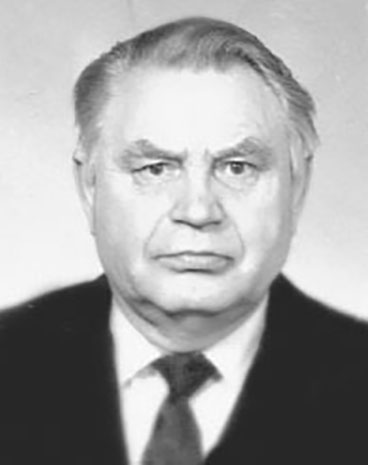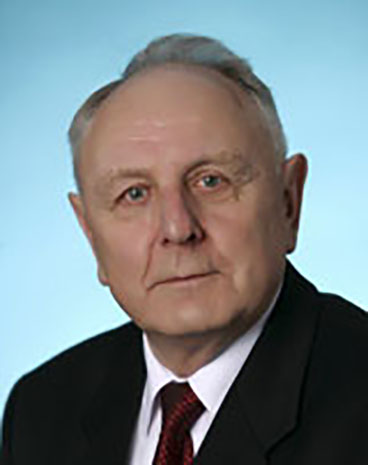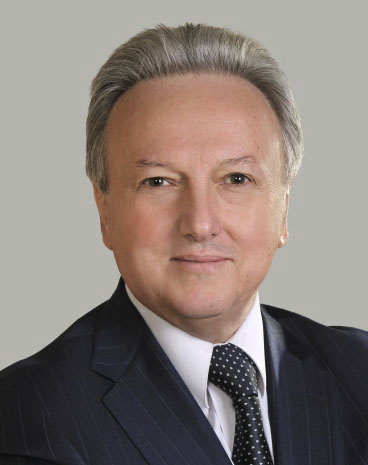Center history

KARELIN
Nikolay Efimovich
Honored Doctor of the BSSR
For the development of scientific research aimed at effective prevention and reduction of morbidity and disability in the Belarusian Soviet Socialist Republic (hereinafter referred to as the BSSR), by the resolution of the Council of Ministers of the BSSR No. 257 dated September 1, 1967, the Belarusian research laboratory for the assessment of the work ability and organization of work of disabled people was organized (hereinafter - BNILETIN). It began its legal existence on October 5, 1967. The head of the laboratory was Nikolai Efimovich Karelin , an excellent doctor and a wonderful organizer. In 1967, 11 researchers worked in the laboratory, including 7 candidates of science.
A hospital with 300 beds became the clinical base for scientific work by BNILETIN employees , the opening of which was approved in 1968 by a decree of the Ministry of Social Security of the BSSR in 1968 and actually took place in April 1969.
The scale of the tasks solved by BNILETIN on the development of criteria for determining the ability to work in certain diseases and injuries, on the development of new methods of functional research to clarify the indications for employment and restoration of the ability to work for disabled people was quite significant.
The most important directions of scientific research of BNILETIN and the activity of the clinic, since 1967, were:
- qualified medical and labor expertise;
- prevention of disability and its severity;
- rehabilitation of the sick and disabled.
In the first years after its formation, the activities of BNILETIN were aimed at developing scientific, organizational and methodological issues of medical and labor assessment, restoration of working capacity, prevention of disability and employment of disabled people. The assessment of working capacity was a new direction in the development of science, therefore its development was a rather difficult task. The young team was given organizational, methodological, scientific and practical tasks to train qualified personnel, improve the expert and scientific qualifications of employees, improve the quality of clinical and expert work, and develop scientific research.
With the opening of the hospital, BNILETIN became a methodological and consulting center for medical labor assessment in the Byelorussian SSR. In 1969, the clinic consisted of five departments: neurological, therapeutic, ophthalmological, ENT department, surgical, including orthopedic beds. In addition, the clinic carried out social and medical rehabilitation of patients and invalids with diseases of the organs of hearing, organs of vision and the musculoskeletal system. When organizing the clinic, the most advanced medical equipment at that time was installed.
The tasks facing the laboratory were so ambitious that they revealed the need to create a larger structural institution, which was implemented by the decree of the Council of Ministers of the BSSR dated November 23, 1973, when the laboratory was transformed into the Belarusian Research Institute for the assessment of working capacity and labor organization. disabled people (hereinafter - BNIIETIN, Institute).

TUROVICH
Evgeniy Adamovich
Candidate of Medical Sciences
The first director was Turovich Evgeny Adamovich , senior researcher, candidate of medical sciences, surgeon, veteran of the Great Patriotic War, having military and labor awards.
After giving the laboratory the status of an institute, work was intensified to improve its structure and staffing with highly qualified personnel. By 1978, this task was completed. A significant part of the scientific and medical personnel of the institute (124 people) was trained at the department of medical labor assessment and other departments of the institutes for advanced training of doctors in Minsk, Leningrad, and Moscow. By this time, the specialists of the institute had defended 14 and prepared for the defense of 4 dissertations for the degree of candidate of medical sciences. The institute has already worked 2 doctors and 30 candidates of medical sciences, more than 60 doctors and researchers, as well as 335 senior and junior service personnel.
The BNIIETIN clinic was a functional subdivision of the institute, a base for carrying out scientific research in accordance with the research plan of the institute, a methodological and consulting center for medical and labor assessment in the Byelorussian SSR.
Already in the first decade of the Institute's activity, a large socially significant effect was obtained. During the first ten years, 36,230 people were hospitalized in the departments of the clinic, including 14,990 for the purpose of conducting research and making an expert decision, 21,240 people for the purpose of treatment and rehabilitation.
The presence of a good material and technical base and highly qualified specialists made it possible to carry out up to 700 operations per year both for residents of the BSSR and other union republics. In the otorhinolaryngological, ophthalmological and surgical departments of the clinic, in addition to expert activities, restorative and corrective operations were actively carried out (23 types of operations in total).
The Institute also provided advisory and organizational and methodological assistance on the issues of medical and labor assessment and social and labor rehabilitation of disabled people to residents of the Lithuanian and Moldavian SSR. Over the years, the institute was visited by delegations from more than 15 countries of the world, the institute staff studied foreign experience and shared their own.
Research work was carried out mainly within the framework of the all-Union problem "Medical and labor assessment and social and labor rehabilitation."
The scientific departments of the institute studied and scientifically substantiated the working conditions of the blind, visually impaired, hearing impaired, deaf, who worked in the conditions of educational and production enterprises of the deaf and blind societies. A special place was given to the study of the state of employment and vocational training of disabled people in the BSSR, medical rehabilitation of disabled people.
The performance of work in the clinical and expert direction was not limited only to the establishment of criteria for work ability. In accordance with the tasks facing the BNIIETIN, studies were carried out of great social significance, combining into a single process the clinical and expert assessment of the state of the disabled person's working capacity with the subsequent development of specific rehabilitation programs, including, first of all, measures for employment, vocational training. When fulfilling some scientific topics, it was envisaged to examine the disabled directly in the workplace.
A special place in the research of that time was occupied by the study of the ability to work and employment of invalids of the Great Patriotic War.
The main directions of scientific research in the 80s were as follows:
- study and preparation of recommendations for the prevention of disability of the population;
- improvement of methods and forms of medical and labor assessment of sick and disabled people;
- development and implementation of methods of medical and social and labor rehabilitation of disabled people.
In the eighties, the BNIIETIN clinic actively carried out restorative and corrective operations in the field of otorhinolaryngology, ophthalmology and surgery; an outpatient advisory center was established and operated at full capacity. A number of structural units were also created to provide medical rehabilitation, including exercise therapy with occupational therapy, habilitation of children and adolescents, psychotherapy, occupational therapy, vocational guidance.

ZBOROVSKY
Eduard Iosifovich
Doctor of Medical Sciences, Professor
Since 1986 BNIIETIN was headed by Doctor of Medical Sciences, Professor Zborovsky Eduard Iosifovich. The Institute carried out research on the prevention of disability, on the issues of medical and labor assessment, reconstructive surgery, social and labor rehabilitation, preservation of the working capacity of the elderly. The year 1986 is a significant milestone in the history of the institute and service, - in the republic, the existing concept of attitude towards disabled people was revised, which was reflected in the decree of the Council of Ministers of the BSSR of November 21, 1986, No. organization of labor of disabled people of the Ministry of Social Security of the BSSR ". State measures in relation to persons with disabilities were based on the most important principles formulated in the World Program of Action for Persons with Disabilities, adopted by the United Nations for 1982-1992,
The nineties - the period of formation and development of the state system of measures for the prevention of disability and rehabilitation of disabled people, for the scientific, organizational and methodological support of this direction of state policy. In 1991, the Law “On social protection of disabled people in the Republic of Belarus” was adopted. In 1992, medical and labor expert commissions were transformed into medical and rehabilitation expert commissions and transferred from the Ministry of Social Security to the Ministry of Health, at the same time the departmental affiliation of BNIIETIN was changed.
February 1, 1992 BNIIETINrenamed into the “Belarusian Research Institute for Assessment of Working Ability and Labor Organization of Disabled Persons” of the Ministry of Health of the Republic of Belarus. In accordance with the new goals and objectives, the clinic and the scientific sector of the institute were restructured. During these years, with the participation of BNIIETIN employees, a structural and functional scheme of the rehabilitation service was created and the formation of a unified system of medical rehabilitation in the republic began. Important areas of activity were the development of a system for the rehabilitation of neurological patients with the consequences of cerebral stroke, traumatic brain injuries; creation of a technology for medical and professional rehabilitation for the main disabling pathology; creation of a service for professional counseling and professional adaptation of disabled people at a number of workplaces.
In the nineties, the institute, as the parent organization, provided research by institutions of various departmental affiliations within the framework of the Republican scientific and technical program "To develop methods and technical means for medical and social and labor rehabilitation of disabled people for 1991-1995", the state scientific and technical program "Rehabilitation" (1996-1997, 1998-2000).

SMYCHEK
Vasily Borisovich
Honored Scientist, Doctor of Medical Sciences, Professor
From January 26, 1999 to the present, the institution is headed by Vasily Borisovich Smychek, Honored Scientist, Doctor of Medical Sciences, Professor, successfully combining scientific and pedagogical and research activities For success in the development of health protection, training of highly qualified specialists in 2000. awarded with the badge "Excellence in Health Care of the Republic of Belarus". He was repeatedly awarded with the Honorary Diplomas of the Ministry of Health of the Republic of Belarus. For his great contribution to the development of the system of medical assessment and rehabilitation, the development of modern highly effective rehabilitation technologies, V.B. Smychek in 2010 was awarded the medal "For Labor Merit".
On August 29, 2000, BNIIETIN was renamed into the state institution "Research Institute of Medical and Social Assessment and Rehabilitation" (hereinafter - Research Institute of Medical and Social Assessment and Rehabilitation).
The new millennium was marked by the development of medical rehabilitation, the creation of high-tech methods of treating many nosological forms of the main disabling pathology, the improvement of restorative and reconstruct tive surgery. This required scientific and methodological support for early medical rehabilitation, including after high-tech surgical interventions, as well as after using new methods of conservative treatment. Rehabilitation programs also needed to be improved, rehabilitation protocols were required at various stages of providing rehabilitation assistance for various technological levels of health care.
During the first decade of the new century, the Institute, as a parent organization, took part in the implementation of the branch scientific and technical programs "Medical Rehabilitation" (2001-2003), "Rehabilitation Technologies" (2004-2006) and "Medical Rehabilitation and Assessment" (2007-2009)
















